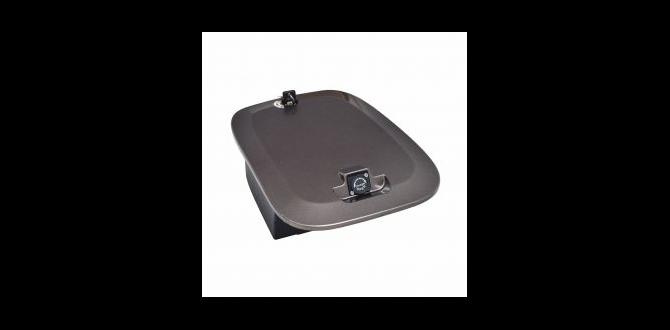Have you ever wondered why your phone seems to charge slower on a hot day? It turns out, storage temperature for lithium-ion batteries plays a big role in how they work. Many people don’t know that extreme heat or cold can affect battery life. This might make you think twice before leaving your gadgets in a car.
Imagine this: You’ve just bought a new tablet. You’re excited to use it, but if you store it in a hot room, how will it perform? Understanding the right storage temperature for lithium-ion batteries is important. It not only helps your devices last longer but also keeps them safe.
Here’s a fun fact: Lithium-ion batteries can lose up to 20% of their capacity if exposed to high temperatures! That’s a lot! It’s essential to learn how to handle these batteries properly. This article will explore the best storage temperatures for lithium-ion batteries, along with some tips to help you take care of them.
Optimal Storage Temperature For Lithium Ion Batteries: Guidelines And Best Practices Lithium-Ion Batteries Are Widely Used In Various Applications, From Smartphones To Electric Vehicles. However, Their Performance And Longevity Can Be Significantly Affected By Storage Conditions, Particularly Temperature. Understanding The Optimal Storage Temperature For Lithium-Ion Batteries Is Essential For Maintaining Their Efficiency And Extending Their Lifespan. Importance Of Storage Temperature Lithium-Ion Batteries Are Sensitive To Temperature Fluctuations. High Temperatures Can Accelerate Chemical Reactions Within The Battery, Leading To Faster Degradation, While Low Temperatures Can Slow Down These Reactions, Potentially Causing A Temporary Lack Of Performance. Understanding And Maintaining The Correct Storage Temperature Can Help In Preventing Damage And Ensuring Optimal Performance. Recommended Storage Temperature The Ideal Storage Temperature For Lithium-Ion Batteries Typically Ranges From 20°C To 25°C (68°F To 77°F). Storing Batteries Within This Range Helps Minimize Self-Discharge Rates And Reduces The Risk Of Thermal Runaway, A Critical Safety Concern. It’S Important To Avoid Extreme Temperatures—Both High And Low—As These Can Adversely Affect Battery Health. Effects Of High Temperatures Storing Lithium-Ion Batteries At High Temperatures (Above 30°C Or 86°F) Can Lead To Various Issues, Including: – Increased Self-Discharge Rate – Reduced Cycle Life – Risk Of Leakage And Thermal Runaway – Decreased Capacity And Efficiency Effects Of Low Temperatures Conversely, Storing Lithium-Ion Batteries In Excessively Low Temperatures (Below 0°C Or 32°F) Can Also Lead To Problems, Such As: – Temporary Capacity Loss – Increased Internal Resistance – Risk Of Formation Of Lithium Plating, Which Can Cause Damage Best Practices For Battery Storage To Ensure The Longevity And Performance Of Lithium-Ion Batteries, Consider Following These Best Practices: 1. **Store In A Controlled Environment**: Keep Batteries In An Environment With Stable Temperatures, Ideally In The Recommended Range. 2. **Avoid Humidity**: Store Batteries In A Dry Place To Prevent Moisture Ingress, Which Can Damage The Cells. 3. **Charge Levels**: Aim To Store Batteries At Around 40% To 60% State Of Charge For Optimal Longevity. 4. **Monitor Conditions**: Use A Battery Management System That Can Monitor Temperature And Charge Levels If Utilizing Batteries In Critical Applications. Conclusion Understanding The Optimal Storage Temperature For Lithium-Ion Batteries Is Crucial For Anyone Who Relies On This Technology. By Adhering To Recommended Practices, You Can Significantly Extend The Lifespan Of Your Batteries, Maintain Their Performance, And Ensure Safety During Storage.

Storage Temperature for Lithium-Ion Batteries
Did you know that how you store lithium-ion batteries can affect their life? Keeping these batteries at the right temperature is crucial. Ideally, a cool place between 20°C and 25°C is best. Extreme heat can cause damage, while very cold conditions can lead to performance issues. Always avoid leaving batteries in hot cars or other warm areas. By storing them properly, you can avoid costly replacements and keep your devices running longer!Recommended Storage Temperature Ranges
Ideal temperature range for storing lithiumion batteries. Consequences of storing outside recommended temperature ranges.Storing lithium-ion batteries requires some TLC, especially with temperature! The ideal temperature range is between 15°C to 25°C (59°F to 77°F). Too hot or too cold can cause trouble. If batteries get too warm, they might leak, or worse, explode! On the flip side, cold temperatures can lead to reduced battery life. So, keep them cozy!
| Temperature Range | Battery Condition |
|---|---|
| 15°C to 25°C | Ideal |
| Above 30°C | Risk of damage |
| Below 0°C | Reduced lifespan |
In short, keeping your batteries at the right temperature is key! Think of it as giving them a warm hug—too hot or too cold, and they might just get cranky!
Effects of Low Storage Temperatures
Impact on battery capacity and charge retention. Risks of freezing and its effects on battery integrity.When batteries are stored in cold places, they can lose power faster. Low temperatures harm battery capacity and make it hard to keep a charge. If it gets too cold, batteries can freeze. This can damage their structure and make them unsafe. It’s important to check storage temperatures to keep batteries working well.
What happens if lithium-ion batteries freeze?
Freezing can cause breaks and leaks. This damage stops the battery from working and can lead to danger. So, always store them at the right temperature to keep them safe!
- Cold temps reduce performance.
- Freezing can break battery cells.
- Keeps them from holding a charge.
Effects of High Storage Temperatures
Deterioration of battery components at elevated temperatures. Potential for thermal runaway and safety concerns.High storage temperatures can be really tough on lithium-ion batteries. When things heat up, the battery’s parts don’t play nice anymore, causing *deterioration*. Imagine trying to work in a sauna; not fun! This problem doesn’t end there; if temperatures rise too much, it could lead to thermal runaway. That’s a fancy term that means things could turn dangerous! So, keep batteries cool, or they might throw a fiery tantrum.
| Temperature (°C) | Effect |
|---|---|
| 35 | Normal storage |
| 50 | Deterioration starts |
| 60+ | Risk of thermal runaway |
Strategies for Proper Storage
Best practices for maintaining optimal storage conditions. Use of temperaturecontrolled environments and monitoring tools.To store lithium-ion batteries safely, choose the right temperature. Cool, dry places work best! Aim for 40°F to 85°F. It’s like keeping your ice cream in the freezer, not on the counter! For extra help, try using temperature-controlled environments. These ensure batteries stay happy. Don’t forget monitoring tools. They’re like little battery babysitters, reminding you if conditions change. Keeping an eye on these things can save your battery life and prevent surprises!
| Storage Temperature | Battery Health |
|---|---|
| 40°F | Best for storage |
| 60°F | Good for regular use |
| 85°F | Poor for longevity |
Signs of Battery Degradation
How to identify if a battery has been adversely affected by temperature. Understanding battery health indicators and performance metrics.Battery health can wave a big red flag if temperatures go haywire. High or low temperatures can cause damage, so keep an eye out! If your battery is getting hot enough to fry an egg, that’s a sign. Also, if your gadget runs out of juice faster than it used to, that’s another clue. You can check these health indicators to see what’s happening:
| Signs of Degradation | What to Look For |
|---|---|
| Overheating | Feels hot to the touch |
| Shorter Usage Time | Drains quickly, like it’s on a race! |
| Swelling | Looks like it’s been hitting the gym too hard |
Keeping batteries at the right storage temperature can help them last longer. If they show any of these signs, it might be time to replace them before they leave you in the dark!
Real-World Applications and Considerations
Implications for consumer electronics and electric vehicles. Industrial usage and how temperature affects inventory management.Imagine a world where our smartphones and electric cars run as smoothly as a well-oiled machine. However, the right storage temperature for lithium-ion batteries is crucial in achieving that! If these batteries get too hot or too cold, they can lose power faster than a kid on a sugar rush. For consumer electronics, like tablets and laptops, extreme temperatures can affect performance and lifespan. In electric vehicles, battery temperature directly impacts range and charging time—nobody wants to be that driver stuck on the side of the road!
| Temperature Range | Effect on Batteries |
|---|---|
| 0°C to 25°C | Ideal performance and longevity |
| Above 35°C | Increased wear and shorter life |
| Below 0°C | Reduced efficiency and power |
For industrial use, proper temperature controls help businesses manage inventory better, keeping batteries safe and effective. A well-stored battery is like that one friend who always brings snacks to a party—essential and appreciated!
Future Trends in Battery Storage Technologies
Innovations in battery materials that enhance temperature resilience. The role of smart storage solutions in managing battery health.New battery materials are making big changes. They help batteries work better in all temperatures. This means they last longer and charge faster. Companies are also using smart solutions. These tools keep track of battery health. They make sure batteries stay safe and work well over time. With these advances, we can look forward to even better batteries in the future!
What are the latest innovations in battery materials?
New materials increase battery strength and heat resistance. This helps them perform well in hot or cold temperatures.
How do smart storage solutions help batteries?
- They monitor battery performance.
- They prevent overheating.
- They extend battery life by managing charge cycles.
Conclusion
In summary, storage temperature is crucial for keeping lithium-ion batteries safe and efficient. Always store them in cool, dry places. Avoid extreme heat and cold to prevent damage and extend battery life. You can check manufacturer guidelines for the best storage conditions. For more information, dive into resources about battery care and enjoy using your devices longer!FAQs
What Is The Optimal Storage Temperature Range For Lithium-Ion Batteries To Maximize Their Lifespan And Performance?To keep lithium-ion batteries in good shape, store them between 32°F and 77°F (0°C and 25°C). This range helps the batteries last longer and work better. If you keep them too hot or too cold, they can get damaged. Remember, a cool and dry place is best!
How Does Extreme Heat Or Cold Impact The Chemical Stability And Safety Of Lithium-Ion Batteries During Storage?Extreme heat can make lithium-ion batteries, which are used in phones and other devices, less safe. It can cause the battery to overheat, which may lead to fires or explosions. Cold temperatures can also be a problem. They can make the battery work poorly and possibly damage it. Storing batteries in a safe temperature is very important for keeping them stable and safe.
Are There Specific Storage Practices Or Precautions That Should Be Taken To Protect Lithium-Ion Batteries From Temperature Fluctuations?Yes, we should take care of lithium-ion batteries to keep them safe. Store them in a cool, dry place, away from heat. Avoid leaving them in hot cars or cold places. Check the temperature because too much heat or cold can hurt the battery. This way, we can help the battery last longer!
What Adverse Effects Can Occur If Lithium-Ion Batteries Are Stored For Extended Periods Outside Of Their Recommended Temperature Range?If you store lithium-ion batteries in very hot or very cold places, they can get damaged. They might not hold a charge as well. Sometimes, they can even leak or burst. This can make them dangerous to use or throw away. Always keep batteries at the right temperature to help them last longer.
How Does The Age And State Of Charge Of A Lithium-Ion Battery Influence Its Ideal Storage Temperature?The age of a lithium-ion battery and how charged it is can change the best temperature for keeping it. Older batteries and those that are fully charged like cooler temperatures. If you store a battery that is only half charged, a warmer place is okay. Always try to keep batteries at a temperature between 32°F and 68°F (0°C and 20°C) for the best results. This helps the battery last longer!






